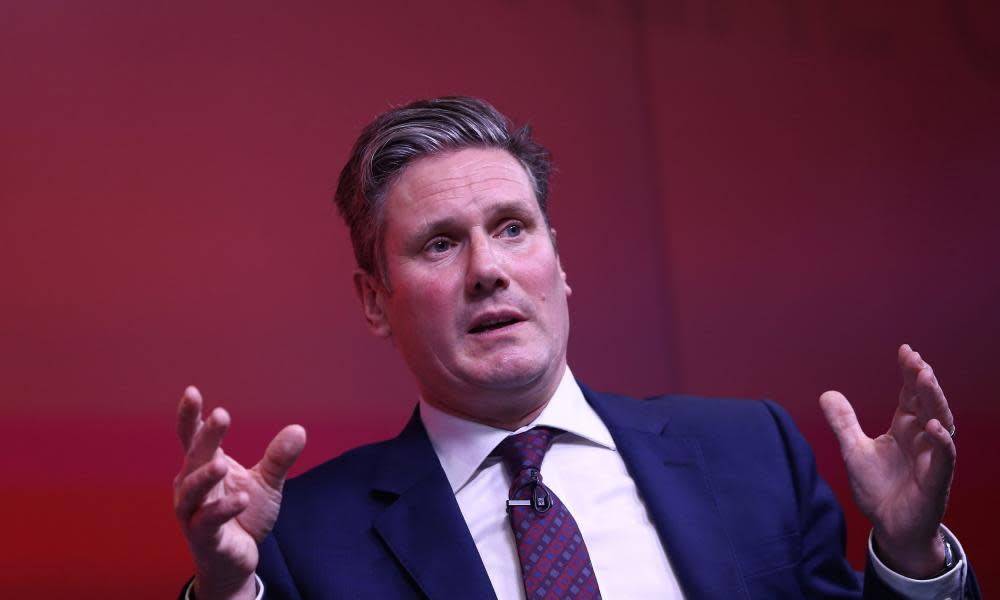Labour to set out tough new conditions for backing Brexit

Labour will refuse to vote in the House of Commons for any Brexit deal struck between Theresa May and the 27 remaining EU states unless the deal ensures precisely the same economic and trade benefits as Britain currently gains from full membership.
In a major policy speech on Monday, Labour’s Brexit spokesman, Keir Starmer, will set out six tests for May and EU leaders to meet, including a requirement that any agreement delivers the “exact same benefits” as the UK enjoys from being inside the single market and customs union.
The same phrase was deployed in a Commons debate in January by the Brexit secretary David Davis, when he tried to reassure the pro-EU Tory MP Anna Soubry that there was a clear plan for Brexit that would not harm the UK economy. Davis said a new “comprehensive free trade agreement and a comprehensive customs agreement” would deliver “the exact same benefits as we have [now]” after the UK leaves.
The demands by Starmer will set the bar high for Labour’s backing of any deal when it is eventually put to a vote in parliament, and represent a toughening of the party’s position with just three days to go before the prime minister triggers article 50 – the formal process for starting exit talks and ending the UK’s 44-year membership of the EU.
In a further sign that success for May is far from guaranteed, the former European commission president José Manuel Barroso told the Observer that the whole process has got off to a bad start with both sides being too intransigent in the initial pre-negotiation skirmishes.
Speaking as EU leaders celebrated the 60th anniversary of the founding treaty of Rome, Barroso said: “I think both sides until now mostly put the issue in terms of a zero-sum game, and I think this is not helpful. What they should understand, both sides, is that we have to work constructively because, whether some people like it or not, Britain will be part of Europe. Some people both on the continent and in the UK don’t like the idea that Britain is part of Europe – but it is.” He said that “strategic thinking and leadership” were needed from now on to ensure a deal could be put together in two years’ time.
May has said that she believes “no deal is better than a bad deal”, while some in her cabinet have openly talked up the prospect of walking away from the negotiating table.
The EU’s chief negotiator, Michel Barnier, has made the settlement of Britain’s £50bn financial liabilities a prerequisite for any progress. Last week he conjured up a vision of queues at Dover and nuclear fuel shortages and chaos for citizens as a consequence of Britain’s failure to live up to its “responsibility”.
On Wednesday the prime minister will write a letter to Donald Tusk, president of the European council, notifying him of the UK’s intention to leave. She will then deliver a full statement in the Commons.
The next day the government will publish a white paper on its plans for a “great repeal bill” in the next Queen’s speech, which will formally incorporate the mass of EU law into UK law. Ministers will announce temporary powers they can use to ensure that those EU laws that cannot function within the UK system can be “corrected” by secondary legislation.
In his speech at Chatham House in London, Starmer will demand that May abandons any suggestion that she might walk away without a deal if the negotiations hit the rocks. He will insist, too, that the UK and EU agree transitional arrangements to prevent Britain having a “cliff-edge” fall out of the EU, when it would have to comply with high-tariff World Trade Organisation rules.
Party sources said that now that the talks were about to get under way – and Labour could not be accused of trying to block Brexit – Labour’s task was to ensure that the country did not break all links with the EU in ideologically driven pursuit of the hardest possible form of Brexit, but instead stayed as close to its European partners as possible. Starmer is expected to warn against “increasingly powerful moves on the government benches to sever our links with Europe” altogether.
Barroso said: “Of course, Britain not keeping the responsibility of membership cannot expect the privileges of membership, that’s quite clear. Having said that, I think it is possible to come to a constructive agreement that minimises the negative points and offers some way forward. But that requires on both sides strategic thinking and leadership.”
Starmer will also say that any deal must protect national security and allow cross-border crime to be tackled as effectively as it is with the UK inside Europol. He will stress the need for migration to be managed in the interests of both the economy and local communities.

 Yahoo News
Yahoo News 
